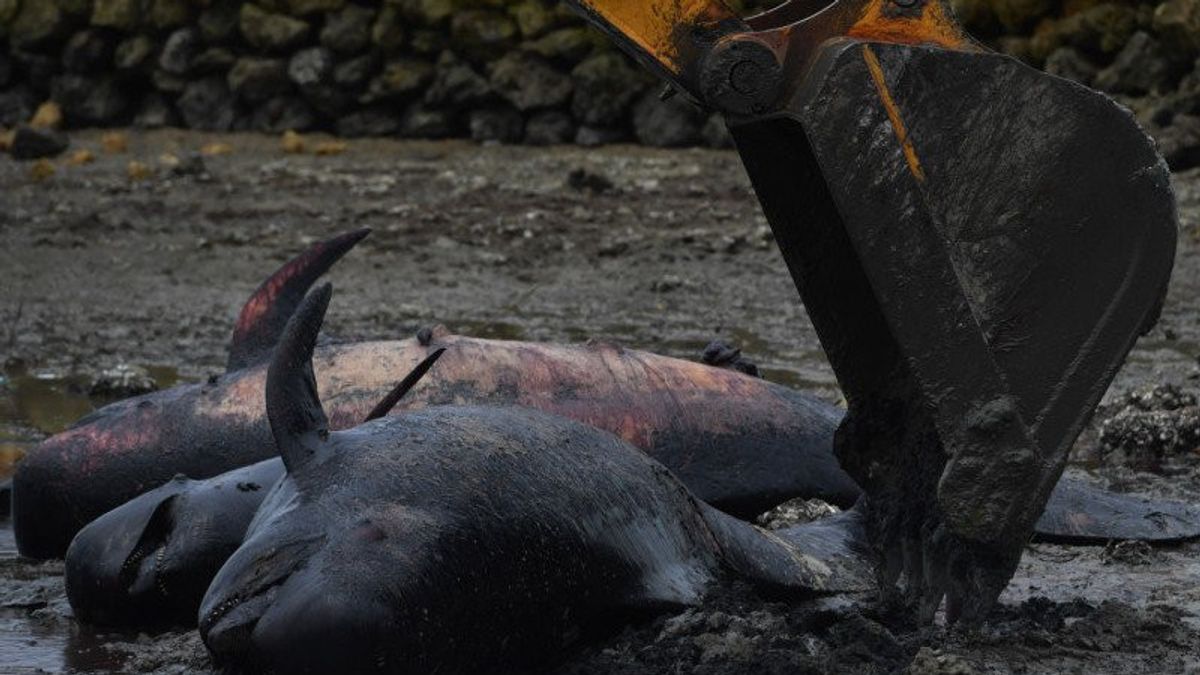JAKARTA - A team of researchers from the Faculty of Veterinary Medicine, Airlangga University revealed 52 short-fin pilot whales washed up on Modung Beach in Bangkalan Regency, East Java due to a disease experienced by some colony leaders.
Veterinarians from Veterinary Faculty of Airlangga University, Drh. Bilqisthi Ari Putra revealed the results of an investigation into the stranding of 52 short-fin pilot whales in Jakarta, Monday, April 12. The results found the leader of the colony of shortfin pilot whales suffered abnormalities in the organs of his navigation system.
Bilqisthi called the sonar transmitter organ called "melon" from the colony leader was actually healthy and normal, but the part of the muscle associated with the sonar transmitter organ had cell death so that the melon could not be used completely optimally.
The whale relies on navigation from the sonar to look around and determine direction. Whale navigation organs called melons are like eyeballs that can move in different directions with the help of muscles.
But the muscles attached to the melon organs of the colony's leader whales are deformed. "It's like the human eye is squinting," Bilqisthi said.
Whales are marine mammals that live in groups led by a colony. The colony of 52 whales stranded in East Java is led by females who are also the largest inductees among other whales.
Because whales are colonized animals, the direction of movement of these often migratory marine mammals follows the leader of the colony. But unfortunately, the condition of the leader of the pilot whale colony has an unhealthy physical condition and navigational abnormalities.
The FKH Unair team concluded that as many as 52 whales were stranded on Modung Beach due to following the direction of movement of leaders who had navigational abnormalities.
SEE ALSO:
The 52 stranded whales are known to be migrating in their hunt for food. It is known from the results of the examination of the empty whale's stomach without any food.
In addition to organ abnormalities, the colony leader's female whale is also known to have emphysema in her lungs that can make the whale short of breathing. "In humans, it's like shortness of breath or asthma," he said.
In addition, the female whale also has inflammation in her intestines and stomach that has been chronic or occurred for a long time. The FKH Unair team also examined two male whales with chronic lung disorders such as pneumonia and lumps in their respiratory organs.
Bilqisthi revealed whales are wildlife and not a few wild animals that have chronic diseases on their bodies.
"There is no healthy wildlife one hundred percent. What we find is the majority of chronic diseases, which means they've been symptomatic for quite some time. The probable cause of water quality is possible," he said.
The English, Chinese, Japanese, Arabic, and French versions are automatically generated by the AI. So there may still be inaccuracies in translating, please always see Indonesian as our main language. (system supported by DigitalSiber.id)



















